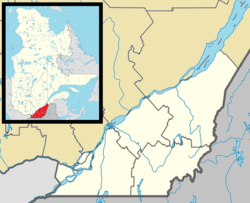Rigaud, Quebec
| Rigaud | |
|---|---|
| Municipality | |
 |
|
 Location within Vaudreuil-Soulanges RCM |
|
| Location in southern Quebec | |
| Coordinates: 45°29′N 74°18′W / 45.483°N 74.300°WCoordinates: 45°29′N 74°18′W / 45.483°N 74.300°W | |
| Country |
|
| Province |
|
| Region | Montérégie |
| RCM | Vaudreuil-Soulanges |
| Constituted | November 29, 1995 |
| Government | |
| • Mayor | Hans Gruenwald Jr |
| • Federal riding | Vaudreuil-Soulanges |
| • Prov. riding | Soulanges |
| Area | |
| • Total | 114.00 km2 (44.02 sq mi) |
| • Land | 99.12 km2 (38.27 sq mi) |
| Population (2014) | |
| • Total | 7,566 |
| • Density | 74.1/km2 (192/sq mi) |
| • Pop 2006-2011 |
|
| • Dwellings | 3,254 |
| Time zone | EST (UTC−5) |
| • Summer (DST) | EDT (UTC−4) |
| Postal code(s) | J0P 1P0 |
| Area code(s) | 450 and 579 |
| Highways |
|
| Website | www |
Rigaud is a municipality in southwestern Quebec, Canada in the county of Vaudreuil-Soulanges in Vallée-du-Haut-Saint-Laurent region. The municipality is located at the junction of Ottawa River and Rigaud River. It is situated about 70 kilometres west of downtown Montreal and 130 kilometres east of Ottawa. The population as of the Canada 2011 Census was 7,346.
The town was named for Pierre François de Rigaud, Marquis de Vaudreuil-Cavagnal, the last governor of New France.
Rigaud is located at the northwestern part of the Suroît region, which is part of the Montérégie administrative region, on the Ontario-Quebec border. Across the Ottawa River lies the Laurentides region. Neighbouring municipalities are Hudson, Vaudreuil-Dorion (Hudson Acres), Sainte-Marthe, Très-Saint-Rédempteur, East Hawkesbury and Pointe-Fortune. The municipality located across Ottawa River is Saint-André-d'Argenteuil. The geographic location of Rigaud, at the head of the Ottawa River and then between the Montreal and Ottawa metropolitan areas, has contributed largely to its economic development throughout its history.
The land area of the municipality is 99 km². The relief is composed, on the North side, of the Ottawa River plain and, on the South side, of Mount Rigaud. The Ottawa River and Mount Rigaud are the main elements in the landscape. The plain is partly used for agricultural purposes and partly in bush. Mount Rigaud covers an area of 47 km². A lot of rock pieces scatter the woods all over the mountain. It is a moraine shaped by a glacier that, by moving, broke up from the bedrock of the Canadian Shield, fragments that it disaggregated and rounded by rolling over them, moving them and leaving them in this basin, some thousand years ago, at the end of the Wisconsin glaciation.
...
Wikipedia

